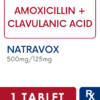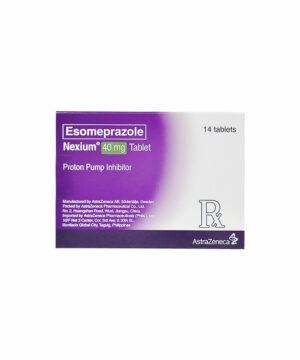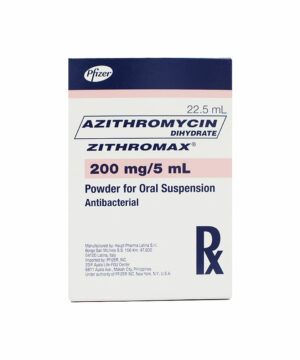Description
Buy Natravox 500mg/125mg Tablet at Rose Pharmacy Online Pharmacy
Description :
Natravox: Each 250 mg/125 mg and 500 mg/125 mg tablet contains amoxicillin 250 mg and 500 mg, respectively and clavulanic acid 125 mg.
Each 125 mg/31.25 mg, 250 mg/62.5 mg and 400 mg/57 mg oral suspension contains amoxicillin 125 mg, 250 mg and 400 mg, respectively and clavulanic acid 31.25 mg, 62.5 mg and 57 mg, respectively.
Natravox Injection: 500 mg/100 mg: Each powder vial contains amoxicillin sodium equivalent to 500 mg amoxicillin and potassium clavulanate equivalent to 100 mg clavulanic acid.
1000 mg/200 mg: Each powder vial contains amoxicillin sodium equivalent to 1000 mg amoxicillin and potassium clavulanate equivalent to 200 mg clavulanic acid.
These powder vials are for reconstitution as an intravenous injection or infusion
Indications / Uses :
Upper Respiratory Tract Infections (including ENT): Sinusitis, otitis media, recurrent tonsillitis. These infections are often caused by Streptococcus pneumoniae, Haemophilus influenzae, Moraxella catarrhalis and Streptococcus pyogenes.
Lower Respiratory Tract Infections: Acute exacerbations of chronic bronchitis, bronchopneumonia, urinary-tract infections often caused by Streptococcus pneumonia, Haemophilus influenzae and Moraxella catarrhalis.
Genitourinary Tract and Abdominal Infections: In particular cystitis (especially when recurrent or complicated, but not prostatitis), septic abortion, pelvic or puerperal sepsis and intra-abdominal sepsis. These infections are often caused by Enterobacteriaceae (mainly Escherichia coli), Staphylococcus saprophyticus, Enterococcus species.
Skin and Soft Tissue Infections: In particular cellulitis, animal bites and severe dental abscess with spreading cellulites caused by Staphylococcus aureus, Streptococcus pyogenes and Bacteroides species.
Administration :
May be taken with or without food: May be given w/o regard to meals. Best taken at the start of meals for better absorption & to reduce GI discomfort.
Contraindications :
Co-amoxiclav is contraindicated in patients with a history of allergic reactions to any penicillin. It is also contraindicated in patients with a previous history of amoxicillin-potassium clavulanate-associated cholestatic jaundice/hepatic dysfunction.
Special Precautions :
Changes in liver function tests have been observed in some patients receiving Co-amoxiclav. The clinical significance of these changes is uncertain but Co-amoxiclav should be used with caution in patients with evidence of hepatic dysfunction.
Cholestatic jaundice, which may be severe, but is usually reversible, has been reported rarely. Signs and symptoms may not become apparent for several weeks after treatment has ceased.
In patients with reduced urine output crystalluria has been observed very rarely, predominantly with parenteral therapy. During administration of high doses of amoxicillin it is advisable to maintain adequate fluid intake and urinary output in order to reduce the possibility of amoxicillin crystalluria. Amoxicillin has been reported to precipitate in bladder catheters after intravenous administration of large doses. A regular check of potency should be maintained.
Serious and occasionally fatal hypersensitivity (anaphylactoid) reactions have been reported in patients on penicillin therapy. These reactions are more likely to occur in individuals with a history of penicillin hypersensitivity.
Erythematous rashes have been associated with glandular fever in patients receiving amoxicillin.
Prolonged use may also occasionally result in overgrowth of non-susceptible organisms.














Reviews
There are no reviews yet.